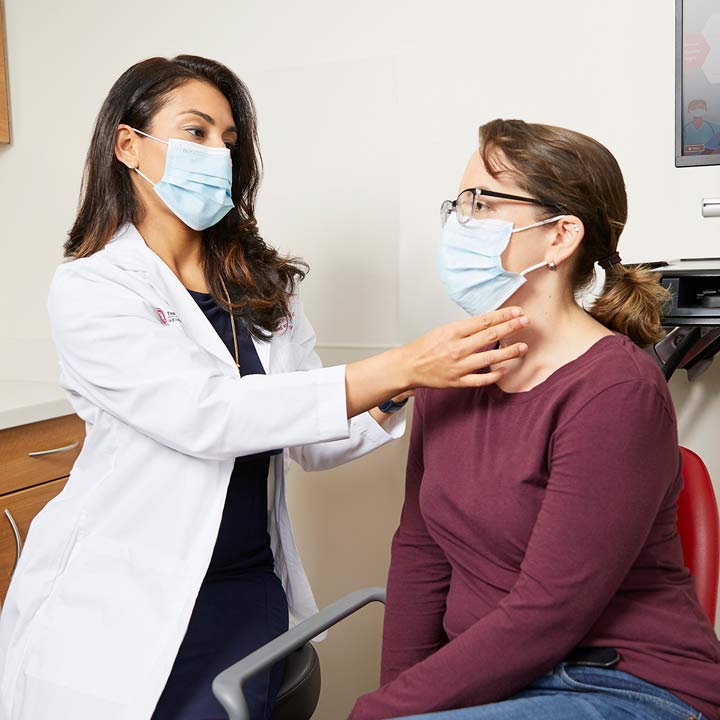 A sore throat is one of the most common reasons for people to see an ear, nose and throat (ENT) specialist. Most people have experienced throat discomfort, usually from a virus or bacterial infection, at one point or another and symptoms went away on their own.
A sore throat is one of the most common reasons for people to see an ear, nose and throat (ENT) specialist. Most people have experienced throat discomfort, usually from a virus or bacterial infection, at one point or another and symptoms went away on their own.
However, some throat issues are more persistent, especially if they lead to dysphagia, which is when people have difficulty swallowing. This can dramatically impact your quality of life, because not only is the condition painful, but it also makes it more difficult to eat, drink and communicate.
If you’re experiencing chronic throat discomfort or dysphagia, the voice and swallowing experts at The Ohio State University Wexner Medical Center are specially trained to help identify the cause and they’re often able to restore full swallowing function with the combination of medications, therapies and procedures or surgeries.
What is dysphagia?
Dysphagia refers to a group of swallowing disorders. You’ve probably experienced the sensation of getting food stuck in your throat or chest once or twice, but with dysphagia, this feeling happens all the time.
With a swallowing disorder, it takes more time and effort to move food from your mouth to your stomach or that process is painful. Your throat (pharynx) is a tube that carries food to your esophagus and air to your windpipe and larynx. There can be issues in one of three areas of the swallowing process that leads to dysphagia. These areas are:
- Oral (mouth)
- Pharyngeal (throat)
- Esophageal (esophagus, or food pipe)
Some people can’t swallow at all, and others have trouble eating, drinking or swallowing saliva. This makes it hard to eat. Often, it can be difficult to take in enough calories and fluids to nourish your body.
What conditions can cause difficulty swallowing?
Dysphagia and throat discomfort have a variety of different causes, ranging from infections to reflux to cancer. Sometimes difficulty swallowing is a complication of another disorder and in other cases, it’s the main symptom.
Disorders that cause throat or swallowing issues include:
- Acid reflux (both gastroesophageal and laryngopharyngeal)
- Laryngitis or pharyngitis (inflammation)
- Diseases that paralyze the vocal cords
- Infections (strep throat, tonsillitis)
- Growths due to lesions or cancer
- Spasms
- Head or spinal cord injury
- Stroke and other neurological diseases, such as ALS or Parkinson’s disease
Symptoms and diagnosis of dysphagia
The main symptom of dysphagia is difficulty swallowing, but there are other symptoms that can be present with swallowing and throat disorders. Possible symptoms include:
- Pain while swallowing
- Sensation of getting food stuck in throat
- Coughing or gagging
- Drooling
- Hoarseness
- Throat growths or legions
- Frequent heartburn
- Sore throat
- Weight loss
We have a number of tools to help us diagnose what might be causing your swallowing and throat issues. To diagnose dysphagia, we’ll use:
- Endoscopy – Fiberoptic endoscopic evaluation of swallowing (FEES) is a specialized test that uses a small camera inserted through the nose to the throat to evaluate a swallowing problem.
- Laryngoscopy – A mirrored, tubular instrument with an illuminated lens is inserted through the mouth to analyze the larynx. The instrument, called a laryngoscope, can also be used to remove tissue samples for further analysis (biopsy).
- Dynamic swallowing study – Swallowing different foods coated in barium allows us to get images to identify muscle or coordination problems in the throat.
- X-ray with contrast – Drinking a barium solution coats the esophagus and makes it easier to see on X-ray.
- Other imaging tools, like a CT scan and MRI
Dysphagia treatment
Choosing to be treated at Ohio State Wexner Medical Center will give you a great chance of improving your swallowing difficulties or getting rid of them completely. Swallowing function can be restored in many patients, along with quality of life.
Our fellowship-trained voice and swallowing specialists (laryngologists) are part of a nationally ranked ENT department, and we have the latest treatments available because of our participation in clinical research and trials. While surgery may be your only option at other hospitals, we often offer various other safe and effective alternatives.
Here are some of the treatments we use for dysphagia:
- Swallowing control therapy – This is performed to help people maximize their nutrition and provides a safe means of swallowing when they have swallowing dysfunction.
- Medications – This includes drugs for gastrointestinal reflux disease as well as corticosteroids for eosinophilic esophagitis or esophageal spasms.
- Diet – Diet changes can impact voice and swallowing disorders.
- Botulinum toxin – When overactive signals from the brain cause vocal cord muscles to spasm, botulinum toxin (BTX) can be injected into the muscles to block the spasms, which diminishes their intensity and frequency.
- Esophageal dilation – We can use an endoscope or flexible tube to gently stretch and dilate your esophagus to make it easier to swallow.
- Surgery – There are a few surgical options available, too.
Additional Information
How would you like to schedule?
Don’t have MyChart? Create an account
